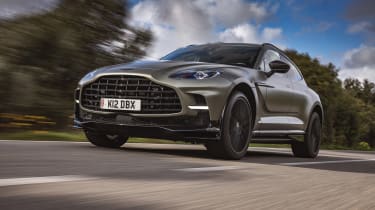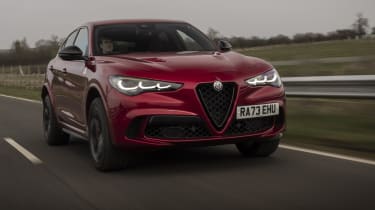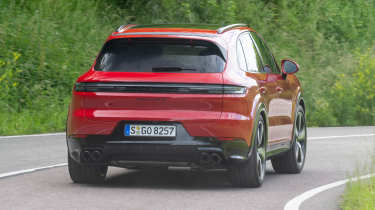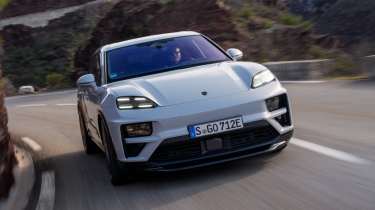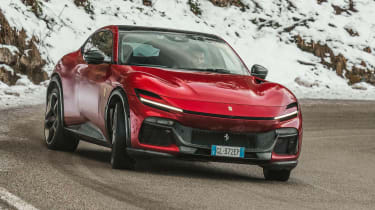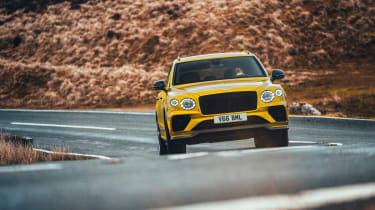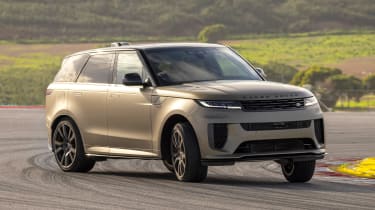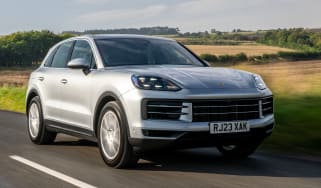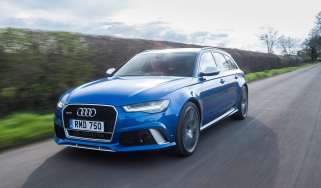Best performance SUVs 2025 – family-friendly supercars on stilts
The best hot SUVs offer entertaining dynamic characters all of their own, even if we'd rather drive an equivalent fast estate...
SUVs by there very top-heavy nature are never the last word in dynamics and driver engagement, even if manufacturers have extracted some truly biblical performance out of them over the years. That said, with iteration, new technologies and a couple of generations to iron out the kinks, some truly epic performance SUVs have broken the mould in recent years. You only need a short drive in the likes of a Porsche Cayenne GTS, Aston Martin DBX707 or Alfa Romeo Stelvio Quadrifoglio to realise that these are cars that have earned their stripes, that have been engineered to sit proudly in dealers alongside 911s, Vantages and Giulias. The numbers they sell in and the profit margins they bring also help keep those more specialised, brand-defining models alive.
You can get anything done with globs of money and engineering mastery, which is why there’s now a Range Rover that’ll drift most of Portimao, and why there’s a five-seat four-door Lamborghini with an off-road ‘Terra’ mode. Land Rover has even stuffed the engine from a BMW M5 and hydraulically cross-linked suspension into a Defender, with the result being akin to a trophy truck with number plates.
Between their titanic powertrains and new-age chassis hardware – from electronic anti-roll bars and active hydraulically-linked independently-controlled suspension to colossal brake packages – the reality is these are some of the most technically impressive and dynamically innovative performance cars on sale right now.
Of course, high-performance SUVs are always a compromise, and we’d much prefer this level of focus be put into more agreeable genres of sports car, but the market speaks, and as it stands it would almost seem foolish for a high-performance manufacturer to be without the financial liberation SUVs can provide.
So here are our favourite performance SUVs on sale in 2025
Top ten best SUVs 2025
- Land Rover Defender Octa
- Aston Martin DBX707
- Alfa Romeo Stelvio Quadrifoglio
- Porsche Cayenne GTS
- Lamborghini Urus SE
- Porsche Macan
- Ferrari Purosangue
- Bentley Bentayga S
- Range Rover Sport SV
Land Rover Defender Octa
Did Land Rover really need to build the Octa given it already has a 5-litre nigh-on 500bhp V8 model in its line-up? If you happen to have a talented team of Special Vehicle Operations techs in the building it would have been rude not to and the resulting machine is truly staggering, redefining how we feel about the super-SUV. Its hardware demonstrates its intent – a 626bhp BMW M-sourced V8, trick hydraulically-linked continuously variable semi-active dampers and 400mm Brembo discs tell half the story, but the Octa’s special talent lies in the way it combines all of it’s elements on- and off-road.
On the road the Octa is unexpectedly impressive, shrugging off the numbness and remote feeling that regular Defenders have, replacing those less-than-ideal attributes with a level of agility and ability that defies its 2585kg kerb weight. It’ll lift up its skirts and fly when you ask it, knocking off the 0-62mph sprint in 3.8sec when launch mode is activated which adds an additional 37lb ft to its already impressive 553lb ft torque peak.
It's equally impressive off-road too, dispatching rock climbs, gravel special stages or rugged tracks. It even has a high performance off-road setting where it’ll do a pretty good impression of a Group A rally car on a special stage. Ultimately the Octa a hugely impressive achievement with far more substance and capability than we were expecting – it really is quite the machine.
> Land Rover Defender Octa review
Aston Martin DBX707
It was only a matter of time before Aston Martin joined the SUV bandwagon, following in the footsteps of Lamborghini, Porsche and Jaguar. Despite the firm’s rocky path in recent years, its engineers have managed to develop a performance SUV that really does deliver on its promise.
The DBX707 is now alone in the lineup, having been refreshed inside with Aston’s latest cabin layout and infotainment. Mercedes-AMG’s 4-litre hot-V twin-turbocharged V8 features as usual, with new ball bearing turbos, an all-new exhaust system and a significant overhaul of the engine mapping. It produces 697bhp and 663lb ft of torque, which are driven through AMG’s nine-speed auto with a wet clutch, which also has a shorter final drive. The 707’s 0-62 time has been knocked right back to 3.3sec, while top speed is now rated at 193mph – good thing it’s on standard carbon-ceramic brakes.
As striking as straight-line performance figures can be, though, this isn’t where the Aston is most impressive. Instead, it’s the dynamic ability that’s quite unlike that of most rivals, with the platform developed from the ground up in order to extract as much performance as possible. The DBX707 has a fluid, delicate GT-like feel, but when the right buttons are pressed, it tightens up brilliantly, emulating on stilts with dizzying effect the finest hot rod estates.
Alfa Romeo Stelvio Quadrifoglio
We adore the Giulia Quadrifoglio, but alongside the brilliant saloon there’s always been its Stelvio cousin, which is almost as good. Unlike almost all of the other options on this list, the Stelvio is relatively lightweight, its edges raw and its character dominant in a class usually defined by the lack of it.
The facelifted Stelvio Quadrifoglio packs the same muscular 513bhp 2.9-litre twin-turbo V6 as its saloon namesake and is capable of a sub-four-second 0-62mph time. The V6 is mated to the familiar eight-speed auto, recalibrated for its SUV application and teamed with Alfa’s Q4 all-wheel-drive system. It’s this all-wheel-drive system that helps the Stelvio feel distinct from the saloon, trading a little of its ultimate agility and precision for the sake of improved traction.
Left in its automatic mode it’s well-mannered and rapid above 3000rpm, but you’ll need to engage Dynamic or Race mode to feel the full force of the V6 with a sharpened throttle response and reduced shift times.
Powertrain aside, the Stelvio Quadrifoglio has a highly entertaining chassis, with the same quick-witted steering feel you get in the Giulia – combine this with strong brakes and decent body control, it’s surprisingly engaging to punt along at speed.
> Alfa Romeo Stelvio Quadrifoglio review
Porsche Cayenne GTS
It’s the sporty SUV that started it all. When Porsche first announced it was putting its iconic badge onto something that wasn’t a low-slung sports car, there was outrage. Porscheophiles were out for blood, incensed that such an abomination should be signed off.
Then the first-generation Cayenne arrived, and once the outrage over the dilution of the brand (and the heinously ugly looks) died down, it became evident that Porsche’s chassis engineers had worked some magic on the Cayenne. It became a sales hit and can, in addition to Porsche’s early-noughties salvation, be credited with the rise of sporty SUVs.
Even with the proliferation of fancier rivals from proper supercar manufacturers, the Cayenne is still one of the best to drive. At the top of the tree is the monstrous, 729bhp Cayenne Turbo E-Hybrid, equipped with a twin-turbocharged V8 and a plug-in hybrid system. An optional GT Package transforms it into a more driver focused SUV with suspension geometry upgrades, ceramic brakes, carbonfibre exterior elements and a titanium exhaust.
But it’s the Cayenne GTS that’s arguably the sweet spot of the lineup, at £33k and 300kg less than the monstrous hybrid. No it’s not a flyweight but that’s far from an insignificant difference and the GTS is lighter on its feet as a result. ‘Just’ 493bhp might make it the motive minnow of this crop but that just means you can revel in the 4-litre twin-turbo V8’s personality for longer before speeds get silly.
> Porsche Cayenne GTS 2024 review – the SUV that might tempt you out of an RS6
Lamborghini Urus SE
We’ll leave the debate as to whether companies such as Lamborghini and Ferrari should be offering SUVs to another day, but the sector is undeniably popular and thus tempting for marques in the business of big business (and bankrolling low-volume supercars that shore up brand image). Lamborghini got in early as the first proper supercar brand to approach the SUV genre in this new era. Revealing the Urus all the way back in 2017, it swiftly reaped the rewards, with the model delivering Lamborghini the deliciously lucrative combination of high sales volumes and high profit margins. Post-pandemic the Urus evolved into a two-pronged lineup, in the Urus Performante and Urus S. Both pure-petrol, each featured the Lamborghini-fettled version of the Volkswagen Group 4-litre twin-turbo V8 putting out 657bhp and 627lb ft of torque.
They were potent enough for most but compared to 2024’s Urus SE and indeed, a number of rivals also listed here, 657bhp is chump change. The newly hybridised Urus SE now puts a combined 789bhp and 700lb ft underfoot. It might be the fastest Urus yet – good for 0-62mph in 3.4sec – but it’s also the most versatile, being also capable, in theory, of 37 miles of all electric driving.
As with virtually all performance SUVs there are a plethora of different driving modes to choose from, but it doesn’t take too long to settle on a setting that suits most driving situations. On smooth surfaces the Urus’s chassis can deliver physics-defying agility, but rougher roads upset its composure, especially with ludicrously large 22- or 23-inch rims.
The Urus SE goes some way to rounding off the rough dynamic edges of the original ICE-only Uruses. It’s also a marginally more attractive thing to behold, relatively speaking of course…
Porsche Macan
The Porsche Macan has been the benchmark fast SUV in its sector for a decade, which puts serious pressure on the newly-launched, fully-electric version. Underpinned by a brand-new PPE platform co-developed with Audi, the Macan delivers a whole new level of performance and refinement compared to the old car – even if we do miss the snarl of the latter's V6.
In top-spec Turbo trim, the Macan is a 630bhp powerhouse that can reach 62mph in 3.3sec, but it's not all about the straight-line performance. There's real finesse to the way it's been set up, and the controls relay the familiar, well-oiled feel we've come to expect from Porsche.
The ride can be a bit knobbly at low speeds, but pick up the pace and the Macan cruises along beautifully, dialling out tyre and wind noise and gathering speed effortlessly. Push harder and there's no escaping that it's a tall, heavy SUV, but it's one that doesn't feel as cumbersome as its enormous 2.4-ton mass would have you believe.
The lineup has grown to four options now, starting with the £68,500 Macan, going all the way up to the £96,900 Turbo. It's safe to assume that a sweet spot GTS model will join the ranks before too long.
> Porsche Macan Electric review – still the driver’s choice for SUVs?
Ferrari Purosangue
The Purosangue is undoubtedly the most divisive, unusual and complex SUV on sale, but somehow, Ferrari's engineers have moulded it into the most exciting of all to drive. Take one look at its technical specification and it's not hard to see why; with an astonishing 6.5-litre V12 up front generating 715bhp the Purosangue has the noise, drama and performance of a traditional Ferrari GT, even if it looks unlike anything we've seen from the brand before.
There's more under the skin. Ferrari has developed a unique suspension technology specifically for its first SUV, which uses electric motors to control the damping forces on the move to counter body roll and absorb bumps in a way that feels alien to most lead-footed, conventional SUVs.
The results are staggering on the road. Yes, the Purosangue sometimes feels synthetic and hyper agile in a way that reveals its electronic complexity, but no SUV feels as fluid, characterful or as playful at the limit.
But while the Purosangue feels more like a sports car than other car of this type, it's also deeply impractical compared to rivals like the Aston Martin DBX707. With four seats and a compromised luggage area, Ferrari has sacrificed some of the usability you'd expect from an SUV to deliver the most engaging, exotic car in the segment.
> Ferrari Purosangue review – there's no SUV quite like it
Bentley Bentayga S
What is there to say about Bentley’s SUV that hasn’t already been said? It’s fast (180mph), heavy (2500kg-ish) and expensive, with V8 and W6 hybrid powertrains available in two body shapes – standard and long-wheelbase.
The V8 and hybrid models can’t match the old W12-engined Speed for pace but will at least go longer without needing an expensive fuel stop. Not that the money will be a problem for most owners – Bentayga orders can run beyond £200k without much difficulty – but fuel stops really are dirty, grubby things for aristocratic hands to be doing.
Back in 2021, the Bentayga picked up a significant update that only just stopped short of being a total redesign. The looks are now a little less offensive, but some will still be put off by the odd hint of Audi Q7 about the interior switchgear. Further (and more minor) changes came near the end last year, when the Bentayga received improved driver assistance systems, a Bang & Olufsen sound system option, new paint and new wheels.
Coming up for a decade on from its introduction, the Bentayga is set for another update. It'll be bestowed with the new Bentley ultra performance hybrid powertrain, adding PHEV convenience to the muscle of the V8.
Range Rover Sport SV
The previous-gen Range Rover Sport SVR was enormously fast and dripping with character, but for some, the rip-snorting V8 SUV was too brash to blend into everyday life as a Range Rover should. The fact that most were bright blue and fitted with 3D number plates didn't do much for its image, either.
For the new Sport SV, Land Rover has turned things around. With a stonking 626bhp 4.4-litre V8 it's a good deal faster than before, but all that potential is clothed in a more subtle design that doesn't draw as many eyeballs as before.
Do you need carbonfibre wheels on your 2560kg performance SUV? Probably not, but specifying these and the SV's optional carbon ceramic brake package saves over 70kg in unsprung mass, enabling a 3.6sec 0-62mph time.
It has the chassis to back up the firepower, too. The SV uses clever cross-linked hydraulic suspension – similar to what you'll find on a McLaren 750S – to deliver a blend of comfort and control that's up there with the very best SUVs on the market. It even makes a decent impression on track, with a precise, honed feel and an exploitable balance. Few customers will ever explore this ability, but it's good to know that Land Rover has engineered it into the SV.



